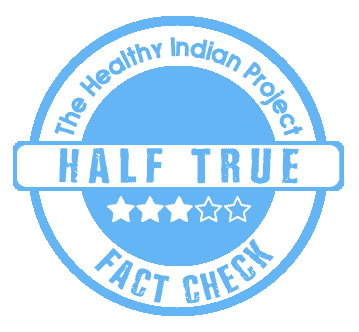Last Updated on February 6, 2024 by Neelam Singh
Quick Take
According to a widely circulated article, a comprehensive review has concluded that making children wear masks throughout the pandemic has caused irreversible brain damage because of the negative effects of prolonged oxygen deprivation. Our fact-checking revealed that the assertion is only half true.

The Claim
The article “BMJ Review Finds Child Mask Mandates Caused Irreversible Brain Damage” argues that children’s brains have been irreversibly harmed by the pandemic’s mask mandates, citing the negative effects of prolonged reduced oxygen levels.
Some individuals on social media have raised concerns about the use of masks for children, questioning their effectiveness and the potential risk of carbon dioxide buildup. To ensure accuracy, we have fact-checked these claims.
Fact Check
Is the assertion presented in the article reliable?
The article “Child Mask Mandates Caused Irreversible Brain Damage, BMJ Review Finds” claims that compelling children to wear masks during the pandemic has led to permanent brain damage due to the adverse effects of prolonged oxygen depletion. This assertion is based on a systematic review published in the Archives of Disease in Childhood, a journal of the British Medical Journal, conducted by Sandlund et al. under the title ‘Child mask mandates for COVID-19: a systematic review.’
Upon closer examination of the article, it is evident that the review did not address the issue of brain damage. On the contrary, the article emphasises that perpetual masking in early childhood is without historical precedent. Moreover, in children, the harms associated with masking are often challenging to identify, measure, and quantify with correlational studies, and many of these outcomes will take years to fully evaluate.
It is important to note that this scholarly article critically evaluates existing scientific literature and does not involve new experiments. However, it does recognise that wearing masks may impact mental health and social-emotional well-being by hindering the accurate interpretation of emotions, especially in younger children. This limitation stems from the misinterpretation of facial expressions, which can lead to increased anxiety and depression.
Finally, the article found no evidence of benefit from masking children. Conversely, the study raises the possibility that mask-wearing may hinder young children’s linguistic and social-emotional development. Special education and autistic children, who rely on facial expressions, may be particularly affected. Schools with mask mandates show higher anxiety levels than those without. Mask-wearing is linked to more physiological harm in children than adults, causing reduced exercise, additional sick days, decreased learning capacity, and increased anxiety. Furthermore, it elevates CO2 levels in children’s inhaled air, surpassing safety standards for adults, and may increase further during physical activity.
Are mask-wearing children at risk for brain damage?
No, not at the moment. Currently, scientific evidence does not strongly support concerns about the impact of mask-wearing on children’s brain health. Paediatric brain damage can result from various causes, such as traumatic incidents, congenital issues, or infections affecting brain development. The unique nature of paediatric brains makes them susceptible to long-term consequences, emphasising the importance of early detection and intervention. Any disruption in neurological development can significantly affect cognitive, motor, and emotional functions. Our research did not find conclusive evidence linking masks to brain damage in children, highlighting the complexity of understanding these potential connections.
However, research indicates that prolonged mask use may contribute to Mask-Induced Exhaustion Syndrome (MIES), resulting in fatigue, discomfort, breathlessness, and dizziness. This could be due to increased respiratory effort, reduced oxygen intake, and the accumulation of exhaled carbon dioxide within masks. Further investigation is needed to better understand these symptoms. Additionally, there is evidence suggesting that the carbon dioxide content in inhaled air may increase to levels beyond acceptable when wearing surgical or FFP2 masks, presenting potential challenges. Some studies have observed short-term changes in human resting brain function with specific mask types, such as KN95 masks. However, additional research is needed to uncover the neural mechanisms and cognitive implications. Therefore, finding a balance between the benefits of masks and addressing associated challenges, including MIES, remains an ongoing focus of research and discussion in paediatric health.

Dr. Debayan Dutta, MBBS, DM (Neurology), MD (Internal Medicine), Neurologist at Apollo Multi-Speciality Hospital in Kolkata, emphasised the importance of wearing face masks during the COVID-19 pandemic to protect the mouth and nose against aerosol droplets. Despite concerns about potential effects on lung function, a study by researchers from Frankfurt University published in Nature Scientific found that wearing masks had no adverse effects on cognitive or brain health. Some reports have mentioned short-term challenges during intense exercise when the body’s demand for oxygen is high. However, long-term studies have not shown any negative impact on cognitive function. For babies to develop properly, it is crucial for their brains to be healthy and free from diseases. In addition to a balanced diet and vaccinations, face masks can provide protection against airborne viral droplets and particles, outweighing any minor inconveniences during heavy exercise.
Is it safe for kids to wear masks?
Masks act as a crucial barrier, reducing the risk of respiratory droplet transmission and contributing to a safer school environment. One of the primary benefits identified is the prevention of virus transmission. However, there are differing opinions on this matter, with some suggesting that prolonged mask use may have developmental implications for children. It is important to consider potential psychological and social impacts and strike a balance between safety measures and the overall well-being of children.
According to the World Health Organisation, children aged 5 years and under, and children with certain developmental issues, cognitive impairments, severe breathing problems, disabilities, or medical conditions that make it hard for them to tolerate masks or breathe properly should not be required to wear masks. Therefore, the decision to wear a face mask should be made by the parent or guardian in consultation with the child’s doctor, taking into account the child’s specific health needs. Balancing health considerations with the potential impacts on a child’s development and well-being is essential in making informed decisions regarding mask-wearing duration.

Dr. Smarajit Maiti, consultant paediatrician and neonatologist at the Bhagirathi Neotia Woman and Child Care Centre in Kolkata, advises that, “Masks without a respiratory valve are not advisable for children. Sir emphasises the importance of ensuring proper ventilation when purchasing masks for children, as a lack of ventilation can lead to hypoxia.” Dr. Maiti also highlights the potential dangers of using masks for babies, as they can lead to suffocation if not carefully monitored. Instead, he recommends focusing on hygiene, proper protection for carers, maintaining cough protocols, and raising awareness.

Dr. Sanjeev Jain, Consultant Pulmonologist, at Fortis Hospital, Delhi, stresses that masks should be used as a barrier and not as a sealant, allowing for intermittent passage of fresh air. Sir also points out that the ambient environment and airflow in a room can affect oxygen availability and the buildup of CO2.
Disclaimer: Medical Science is an ever evolving field. We strive to keep this page updated. In case you notice any discrepancy in the content, please inform us at [email protected]. You can futher read our Correction Policy here. Never disregard professional medical advice or delay seeking medical treatment because of something you have read on or accessed through this website or it's social media channels. Read our Full Disclaimer Here for further information.

